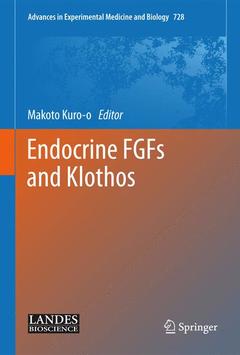Description
Endocrine FGFs and Klothos, 2012
Advances in Experimental Medicine and Biology Series, Vol. 728
Coordinator: Kuro-o Makoto
Language: English
Subject for Endocrine FGFs and Klothos:
Keywords
Endocrine; FGF; Fibroblast growth factor; Klotho; Kuro-o; gene expression
210 p. · 17.8x25.4 cm · Paperback
Description
/li>Contents
/li>Biography
/li>Comment
/li>
The Structural Biology of the FGF19 Subfamily.- Klotho and bKlotho.- FGF23 and Syndromes of Abnormal Renal Phosphate Handling.- Evidence For FGF23 Involvement in a Bone‑Kidney Axis Regulating Bone Mineralization and Systemic Phosphate and Vitamin D Homeostasis.- FGF23, Klotho and Vitamin D Interactions: What Have We Learned from In Vivo Mouse Genetics Studies?.- FGF23 and the Parathyroid.- Regulation of Ion Channels by Secreted Klotho.- FGF23 in Chronic Kidney Disease.- Secreted Klotho and Chronic Kidney Disease.- FGF23 as a Novel Therapeutic Target.- Physiology of FGF15/19.- FGF19 and Cancer.- Understanding the Structure‑Function Relationship Between FGF19 and its Mitogenic and Metabolic Activities.- FGF21 as a Therapeutic Reagent.
MAKOTO KURO-O is an Associate Professor in the Pathology Department at the University of Texas Southwestern Medical Center at Dallas (UT Southwestern). He also has an appointment to the Pak Center for Mineral Metabolism and the Simmons Comprehensive Cancer Center in UT Southwestern. He received his MD and PhD from the University of Tokyo, Japan. His major research interests include molecular mechanisms of aging and age-related diseases with special reference to chronic kidney disease. He is a member of the American Society of Nephrology (ASN).

